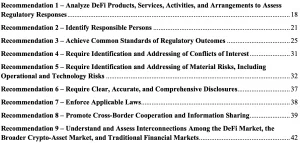
IOSCO Issues Global Guidelines for DeFi, Regulatory Consistency
On December 19, the International Organization of Securities Commissions (IOSCO) issued nine recommendations on implementing policies. In an effort to promote better consistency of regulatory oversight both within and between jurisdictions, the organization is working to achieve this goal.
These recommendations are the culmination of a process that started with the publication of a report at the beginning of the previous year.
Despite the fact that they are not very ground-breaking—Rule 7, for instance, states that one must “enforce applicable laws”—the value lies in the fact that each one is discussed in great length. Therefore, the guidance that is included with Rule 7 provides a summary of the many methods by which a decentralized finance (DeFi) investor or another market player can try to avoid being regulated.

IOSCO DeFi policy recommendations. Source: IOSCO
This document provides a list of prospective tools as well as the recommendation that regulators should evaluate whether or not they possess the proper authority, tools, and resources.
The International Organization for Securities Commissions (IOSCO) aims to promote uniformity in the regulation of crypto-asset markets and securities markets, following the principle of “same activity, same risk, regulatory outcome.”
In November, the organization published a set of recommendations for cryptocurrencies and digital assets, with the DeFi guidelines serving as a companion to that set.
The organization issued a note explaining how to utilize the two sets of recommendations in conjunction with each other, considering the degree of decentralization of the governed body.
“Some industry participants have asserted that if something is decentralized, it is not, or cannot be, regulated. […] However, regardless of a governance structure or how ‘decentralized’ the decision-making is, there is usually a Responsible Person(s) that controls, or sufficiently influences, the offer of products, provision of services, or engagement in activities.”
The study asserts that once its recommendations have been completed, the International Organization for Standardization (IOSCO) will shift its priority to monitoring, regulatory capacity building, and providing technical help to members under the second proposal titled “identify responsible persons.”
More than 130 authorities comprise IOSCO, responsible for regulating 95% of the financial markets around the world.





